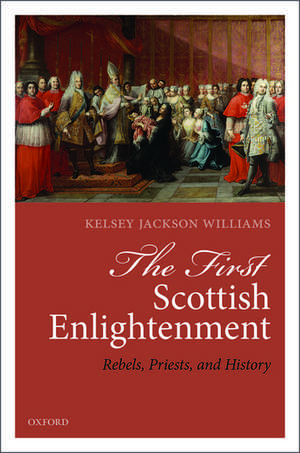The First Scottish Enlightenment: Rebels, Priests, and History
Autor Kelsey Jackson Williamsen Limba Engleză Hardback – 5 mar 2020
Preț: 660.42 lei
Preț vechi: 792.82 lei
-17% Nou
Puncte Express: 991
Preț estimativ în valută:
126.39€ • 131.46$ • 104.34£
126.39€ • 131.46$ • 104.34£
Carte disponibilă
Livrare economică 14-20 martie
Preluare comenzi: 021 569.72.76
Specificații
ISBN-13: 9780198809692
ISBN-10: 0198809697
Pagini: 368
Ilustrații: 10 Illustrations
Dimensiuni: 165 x 240 x 31 mm
Greutate: 0.72 kg
Editura: OUP OXFORD
Colecția OUP Oxford
Locul publicării:Oxford, United Kingdom
ISBN-10: 0198809697
Pagini: 368
Ilustrații: 10 Illustrations
Dimensiuni: 165 x 240 x 31 mm
Greutate: 0.72 kg
Editura: OUP OXFORD
Colecția OUP Oxford
Locul publicării:Oxford, United Kingdom
Recenzii
An excellent study, enriched by the often-brilliant use of myriad sources
Erudite and attractively written, The First Scottish Enlightenment is a compelling reconstruction of historical culture in the first half of the eighteenth century. Connecting the familiar with the overlooked, alive to cosmopolitan links and local peculiarities, it deserves to be widely read.
The book as a whole brings an important intellectual movement out of the shadows of previous neglect. It also reminds us that the story of English antiquaries (and Antiquaries) was not without parallels in Scotland and on the European continent.
Jackson Williams... carefully casts the 'city guard' and 'crowd of citizens' of an older Enlightenment drama in new roles. This new character set inspires comparisons beyond Scotland's north-east and it builds much-needed bridges between British and European political and intellectual histories.
In this remarkable and engaging book, Kelsey Jackson Williams convincingly makes the case for the existence of an early Enlightenment in Scotland, which spanned the 1680s to the 1740s and achieved a dramatic and lasting transformation in the practice and conception of Scottish history.
a text that contributes wonderfully to our understanding of our past as we continue to struggle over how to imagine the future.
First Scottish Enlightenment has many virtues...Overall, this a tremendous contribution to the history of Scottish scholarship and Scottish intellectual history generally.
Erudite and attractively written, The First Scottish Enlightenment is a compelling reconstruction of historical culture in the first half of the eighteenth century. Connecting the familiar with the overlooked, alive to cosmopolitan links and local peculiarities, it deserves to be widely read.
The book as a whole brings an important intellectual movement out of the shadows of previous neglect. It also reminds us that the story of English antiquaries (and Antiquaries) was not without parallels in Scotland and on the European continent.
Jackson Williams... carefully casts the 'city guard' and 'crowd of citizens' of an older Enlightenment drama in new roles. This new character set inspires comparisons beyond Scotland's north-east and it builds much-needed bridges between British and European political and intellectual histories.
In this remarkable and engaging book, Kelsey Jackson Williams convincingly makes the case for the existence of an early Enlightenment in Scotland, which spanned the 1680s to the 1740s and achieved a dramatic and lasting transformation in the practice and conception of Scottish history.
a text that contributes wonderfully to our understanding of our past as we continue to struggle over how to imagine the future.
First Scottish Enlightenment has many virtues...Overall, this a tremendous contribution to the history of Scottish scholarship and Scottish intellectual history generally.
Notă biografică
Kelsey Jackson Williams is Lecturer in Early Modern Literature at the University of Stirling and his research focuses on the intellectual, cultural, and material histories of Scotland, England, and continental Northern Europe. He was educated at Balliol College, University of Oxford, and held posts at Jesus College, University of Oxford, and the University of St Andrews before taking up his present lectureship.
